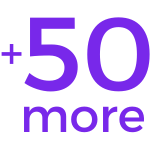In the modern world, attractive design elements are increasingly essential for successful ecommerce stores. A poor site design discourages consumer trust and can negatively influence your bottom line by preventing conversions.
A great site design does more than just attract customers - it guides them through their buyer's journey and encourages conversions altogether. Unfortunately, creating an aesthetically pleasing, responsive website can be tricky if you aren't savvy with CSS and web design, and hiring a designer can be costly.
Fortunately, Shopify page builders make designing your Shopify store both easy and cost-effective. Many builders come with additional features and analytics, including split testing functionality and unique design elements. So let's find out which page builder is best suited to your needs.
Do You Really Need to Get a Shopify Page Builder?
Shopify comes with a library of preexisting templates, providing merchants with various options to design their stores with. However, many of these templates are used frequently by other Shopify store owners, so your ecommerce store may end up on the generic-looking side. So how do you get around this problem without spending hundreds or even thousands of dollars on a professional graphic designer?
The answer: Shopify Page builders. The best page builder apps let Shopify merchants design beautiful site pages with little or zero coding knowledge. So if you're looking for a pocket-friendly way to develop an attractive, engaging Shopify store, a page builder is your best bet.
Features to Consider When Evaluating Page Builders
Shopify apps for page building come with unique features to help you stand out from the competition. However, there are some features common to the most sought after page builders:
Ease of use
A BIG reason to use a page builder is to make your life easier. However, it's out of the running if a page builder is difficult to use or has a steep learning curve. So when looking for good page builders, we prioritize platforms that are intuitive and easy to design with. Some of the best Shopify page builders are zero-code platforms with drag and drop functionality and libraries of pre-built block templates.
Number of pre-built themes
Pre-built themes cut design times down dramatically and help beginners design professional-looking sites. When looking for an easy page builder, check the number of pre-built themes that come out of the box to ensure you have a wide selection to pick from.
Moreover, if the page builder's site offers demos, check the themes out and see which ones best suit your store concept. A good theme isn't just pretty - it's built with conversions in mind. So, the design elements should guide the user through their buying decision and nudge them through the sales funnel.
Customization options
To truly make your product pages yours, you need a page builder with robust customization features. A good page builder lets you design any page you want and make the design unique to your business. So whether you need a comprehensive, immersive About page, an informative Blog page, or a static landing page, a good page builder will have you covered.
The best Shopify builders come with advanced design elements like popups and countdown timers to create a more immersive experience for your customers. When you're vetting page builders, be ruthless about comparing the customization features; they're vital to optimize your customer's experience.
SEO optimization capabilities
Ranking organically in search engines is a ticket to free traffic and new conversions. Thus, a good Shopify page builder app should come with SEO optimization capabilities to help you rank high on SERPs. This capability should include features to add alt-tags, page titles, and meta descriptions, and some page builders even offer product image compression features.
Third-party app integration
Third-party integrations are vital because they expand your customization functionalities and give you access to additional features like data and analytics monitoring. They also allow all pieces of your marketing tech stack to talk to each other. Conversely, a page builder with limited integrations drastically limits your store customizations.
One of the most critical third-party integrations for Shopify merchants is analytics integration. Most store owners rely on Google Analytics and Facebook's Pixel to gain valuable insights into their audiences and make data-driven decisions. Some page builders come with their own analytics, but integrations with Google Analytics and Pixel are the critical features to prioritize.
Split testing
Split testing lets Shopify merchants compare similar pages with slight variations to determine which one performs better. Are you testing a different product creative? Or two different types of copy? Split testing lets you monitor useful insights like clickthrough rates and cart additions to determine the best-performing pages.
Additional analytics
The best Shopify page builders offer additional analytics, including insights into bounce rates, sales conversions, clickthrough destinations, adds to carts, and more. These analytics are helpful in learning about your customer base and optimizing your conversion strategy.
Professional help and support
Quality help and support are essential in case you get stuck somewhere or face a technical issue. If the bulk of your Shopify store is designed with a page builder, your site will be heavily dependent on the page builder's technical standpoint. A good page builder platform should offer dedicated support channels, such as email or live chat support, and a rich knowledge base, including FAQs and documentation.
Most Popular Shopify Page Builders
We covered the must-have features for a good page builder, but which page builder platforms are the best? Here's a list of the most popular builders that offer Shopify merchants great value.
PageFly
PageFly is one of the most popular page builders for Shopify stores, known for its ease-of-use and vast customization features. This builder is perfect for designing responsive web pages, and thanks to PageFly's 24/7 support, you'll never be stuck for long.
PageFly comes with over 60 pre-built themes to choose from, and users can design pages with the help of 50+ design elements. You can get started with the leading page builder for free or subscribe to their silver plan for as low as $19/month.
Shogun
Shogun landing page builder is one of the best Shopify page builders and optimizers in the market. Designed by Shogun labs, the builder's A/B split testing features let you duplicate pages and tweak them to monitor conversions and add to carts for optimizing your sales funnel.
Shogun's SEO features let you add titles and meta descriptions directly, which is super handy. The builder is easy to use, and Shogun's FAQ section and video tutorials can help you learn design essentials fast. The higher Shogun SEO pricing plan gives you access to live chat, so it's easy to drop a question if you get stuck.
GemPages
Gempages comes with a library of easy-to-use templates to help you design an unlimited number of pages, whether you're going for an About page, FAQ pages, collection pages, product pages, or a home page. The builder's lazy loading feature is a popular pick for SEO, as it can significantly speed up page load times.
Gempages' FAQ support is relatively limited, but their 24/7 live chat makes up for it in support. We like how customizable this page builder is - it comes with unique features like video popups and countdown timers to make more interactive pages. Unfortunately, this builder doesn't have native analytics features, but you can integrate with a third-party app and use it instead.
Zipify Page builder
Zipify is one of the best Shopify page funnel builders for optimizing conversions because its pre-built templates were designed with customers in mind. Zipify was built by the owner of a multi-million dollar ecommerce store, so Zipify truly understands how to guide customers through the buyer's journey and drive conversions.
Zipify's Basic Plan gives you access to the essential design features, but you need to upgrade to the Plus Plan for more advanced functionalities such as split testing.
Hypervisual Page Builder
Hypervisual is a powerful design tool with a bit of a learning curve. The platform isn't very intuitive compared to other platforms. Rather than dragging and dropping to build regular pages, you need to use the '+' option to add design elements.
Despite the interface leaving us on the fence, Hypervisual's design features, including pre-designed add-to-cart buttons and built-in signup forms, are pretty impressive. The builder's 'Message Match' feature also lets merchants use split testing, and while the platform lacks its own analytics, it integrates seamlessly with Google Analytics and Facebook Pixel.
Buildify Drag And Drop Page Builder
Buildify is a no-code page builder that lets a merchant design unlimited pages using drag and drop features. The platform is straightforward to use and claims to let you build a great custom page in just 30 minutes.
Beyond its ease of use, Buildify comes with some key features that make it difficult to pass up. These features include access to helpful analytics, a countdown timer, a grid system, and even a progress bar. You can try Buildify out for free with the 7-day trial, after which the simplest plan costs just $12.99 a month. Unfortunately, the builder doesn't come with a free program.
Summary
Finding the right page builder is vital to bring your Shopify store design concepts to life. The best page builders also offer a range of additional features, including split testing functionality, analytics, round-the-clock support, and more.
While there are many great Shopify page builders, there isn't a single 'best' option. To determine which tool is right for you, outline the features that you can't do without, and pick which builder best fulfills your needs within your budget. If there are some functionalities the tool is missing, you may always be able to find workarounds through API calls and integrations.




